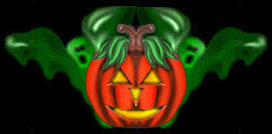 |
 |
 |
The Story of Halloween
Halloween is one of the oldest holidays with origins going back thousands of years. The holiday we know as Halloween has had many influences from many cultures over the centuries. From the Roman's Pomona Day, to the Celtic festival of Samhain, to the Christian holidays of All Saints and All Souls Days.
Hundreds of years ago in what is now Great Britain and Northern France, lived the Celts. The Celts worshipped nature and had many gods, with the sun god as their favorite. It was "he" who commanded their work and their rest times, and who made the earth beautiful and the crops grow.
 The
Celts celebrated their New Year on November 1st. It was celebrated
every year with a festival and marked the end of the "season of
the sun" and the beginning of "the season of darkness and
cold."
The
Celts celebrated their New Year on November 1st. It was celebrated
every year with a festival and marked the end of the "season of
the sun" and the beginning of "the season of darkness and
cold."On October 31st after the crops were all harvested and stored for the long winter the cooking fires in the homes would be extinguished. The Druids, the Celtic priests, would meet in the hilltop in the dark oak forest (oak trees were considered sacred). The Druids would light new fires and offer sacrifices of crops and animals. As they danced around the the fires, the season of the sun passed and the season of darkness would begin.

When the morning arrived the Druids would give an ember from their fires to each family who would then take them home to start new cooking fires. These fires would keep the homes warm and free from evil spirits.
The November 1st festival was called Samhain (pronounced "sow-en"). The festival would last for 3 days. Many people would parade in costumes made from the skins and heads of their animals. This festival would become the first Halloween.

During the first century the Romans invaded Britain. They brought
with them many of their festivals and customs. One of these was the
festival know as Pomona Day, named for their goddess of fruits and
gardens. It was also celebrated around the 1st of November. After
hundreds of years of Roman
rule the customs of the
Celtic's Samhain festival and the Roman Pomona Day mixed becoming 1
major fall holiday.
The next influence came with the spread of the new Christian religion
throughout Europe and Britain. In the year 835 AD the Roman Catholic
Church would make November 1st a church holiday to honor all the
saints. This day was called All Saint's Day, or Hallowmas, or All
Hallows. Years later the Church would make November 2nd a holy day.
It was called All
Souls Day and was to honor the
dead. It was celebrated with big bonfires, parades, and people
dressing
up as saints, angels and
devils.

But the spread of Christianity did not make people forget their early
customs. On the eve of All Hallows, Oct. 31, people continued to
celebrate the festivals of Samhain and Pomona Day. Over the years the
customs from all these holidays mixed. October 31st became known as
All Hallow Even, eventually All Hallow's Eve, Hallowe'en,
and then - Halloween.
The Halloween we celebrate today includes all of these influences, Pomona Day's apples, nuts, and harvest, the Festival of Samhain's black cats, magic, evil spirits and death, and the ghosts, skeletons and skulls from All Saint's Day and All Soul's Day.